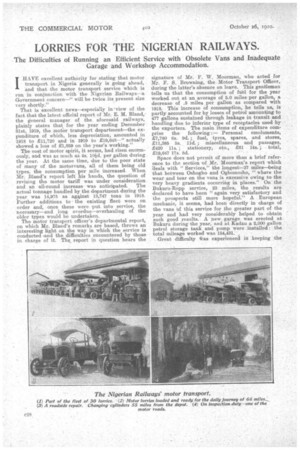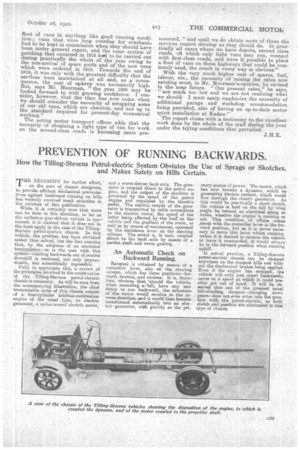LORRIES FO k THE NIGERIAN RAILWAYS.
Page 54

Page 55

If you've noticed an error in this article please click here to report it so we can fix it.
The Difficulties of Running an Efficient Service with Obsolete Vans and Inadequate Garage and Workshop Accommodation.
IHAVE excellent authority for stating that motor transport in Nigeria generally is going ahead, and that the motor transport service which is run in conjunction with the Nigerian Railways—a Government concern—" will be twice its present size very shortly."
That is excellent news—especially in-view of the fact that the latest official report of Mr. E. M. Bland,the general manager of the aforesaid railways, plainly states that for the year ending December 31st, 1919, the motor transport department—the expenditure of which, less depreciation, amounted in 1918 to 211,720 and in 1919 to 219,648—" actually showed a loss of 21,859 on the year's working."
The cost of motor spirit, it seems, had risen enormously, and was as much as 4s. 100. per gallon during the year. At the same time, due to the poor state of many of the motorvans, all of them being old types, the consumption per mile increased. When Mr. Bland's report left his hands, the question of revising the motor tariff was under consideration and an all-round increase was anticipated. The actual tonnage handled by the department during the year was 14,975 as against 13,747 . tons in 1918. Further additions to the existing fleet were on order and, once these were put into service the necessary—and long overdue—overhauling of the older types would be undertaken. The motor transport officer's departmental report, on which Mr. Bland's remarks are based, throws an interesting light on the way in which the service is conducted -and the difficulties encountered by those in charge of it. The report in question bears the signature of Mr. F. W. Moorman, who acted for M. F. S. Browning, the Motor Transport Officer, during the latter's absence on leave. This gentleman tells us that the consumption of fuel for the year worked out at an average of 5.0 miles per gallon, a decrease of .5 miles per gallon as compared with 1918. This increase of consumption, he tells us, is partly accounted for by losses of petrol amounting to 477 gallons sustained through leakage in transit and handling due to inferior type of receptacles used by the exporters. The main items of expenditure comprise the following :— Personal emoluments, 27,780 6s. 9d.' fuel, tyres, spares, and stores, 211,385 5s. 11d. ; miscellaneous and passages, 2420 us. ; stationery, etc., 261 14s. ; total, 19,647 17s. 8d.
Space does not permit of more than a brief reference to the section of Mr. Moorman's report which 'deals with " Services," the longest-37 miles--being that between Oshogbo and Ogbornosho, "where the wear and tear on the vans is excessive owing to the very heavy gradients occurring in places." On the Bukuru-Ropp service, 23 miles, the results are declared to have been "again very satisfactory and the prospects still more hopeful." A European mechanic, it seems, had been directly in charge of the vans of this service for the greater part of the year and had very considerably helped to obtain such good results. A new garage was erected at Bukuru during the year, and at Kada.0 a 2,000 gallon petrol storage tank and pump were installed : the total mileage worked was 154,431.
Great difficulty Was experienced in keeping the fleet of vans in anything like good running condition ; vans that were long overdue for overhaulb had to be kept in commission when they should Lave been under general repair, and the same system of patching that occurred in 1918 had to be carried out during practicallythe whole of the year owing to the non-arrival of spare parts and of the new vans which were ordered in 1918. Towards the end of 1919, it was only with the greatest difficulty that the services were maintained at all and, as a consequence, the cost of upkeep was necessarily high. But, says Mr. Moorman, the year 1920 may be looked forward to with growing confidence. I consider, however, that the time has now come when we should consider the necessity of scrapping some of our old vans, which are obsolete, and not up to the standard required for present-day economical working." The acting motor transport officer adds that the necessity of obtaining a light type of van for work on the second-class roads is becoming more pro nounced, "and until we do obtain more of these the services cannot develop as they should do. In practically all cases where we have depots, second class roads, oil which only light vans may run, connect with first-class roads, and were it possible to place a fleet of vans on these highways that could be commonly used, the result in every way is obvious."
With the very much higher cost of spares, fuel, labour, etc., the necessity of raising the rates now existing must, in Mr. Moorman'skopinion, be revised in the near future. "Our present rates," he says, "are' much too low and we are not realizing what we should. I must again emphasize the necessity of additional garage and workshop accommodation being provided, also of having an up-to-date motor spirit installation at Kadau."
The report closes with a testimony to. the excellent work done by the whole of the staff during the year under the trying conditions that prevailed.




























































